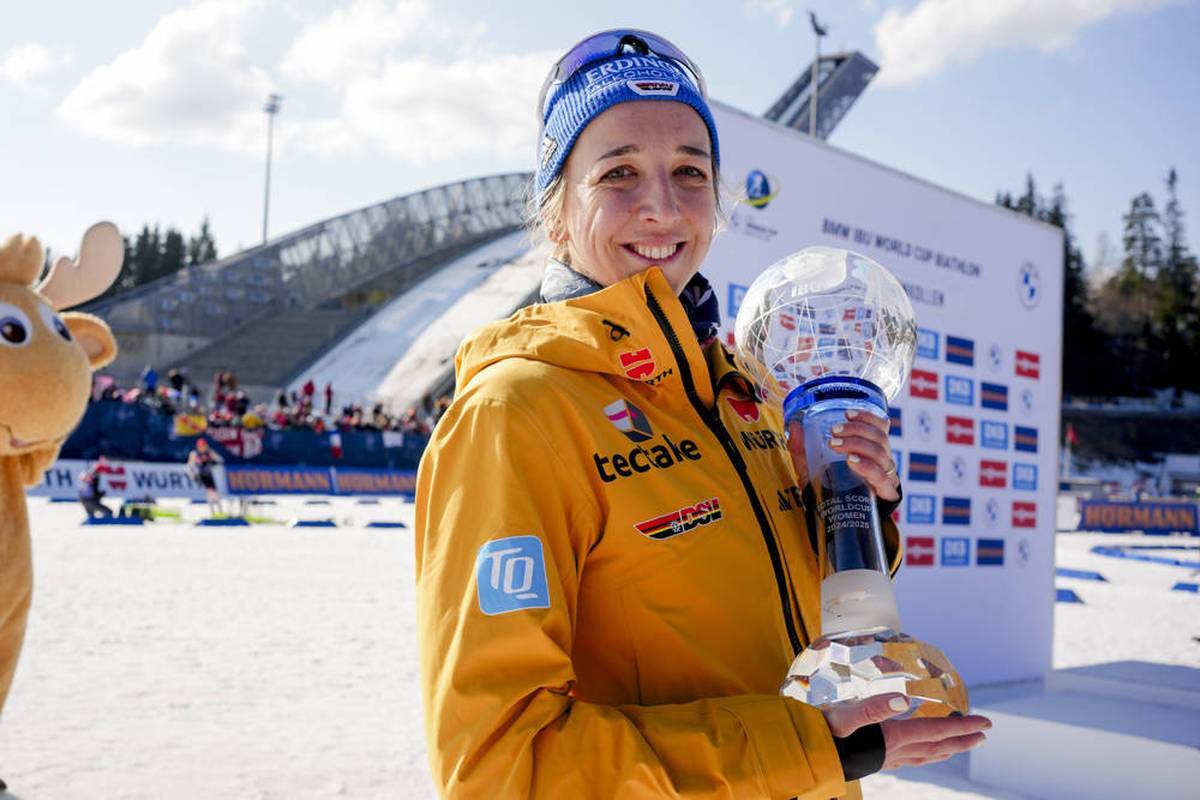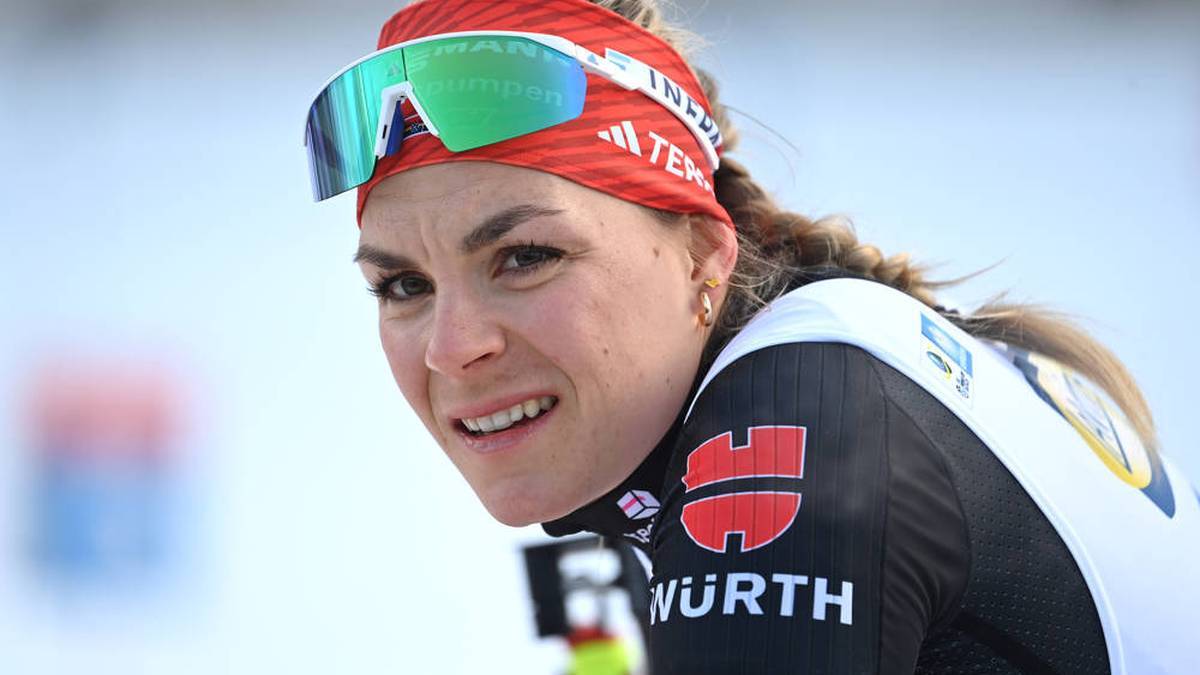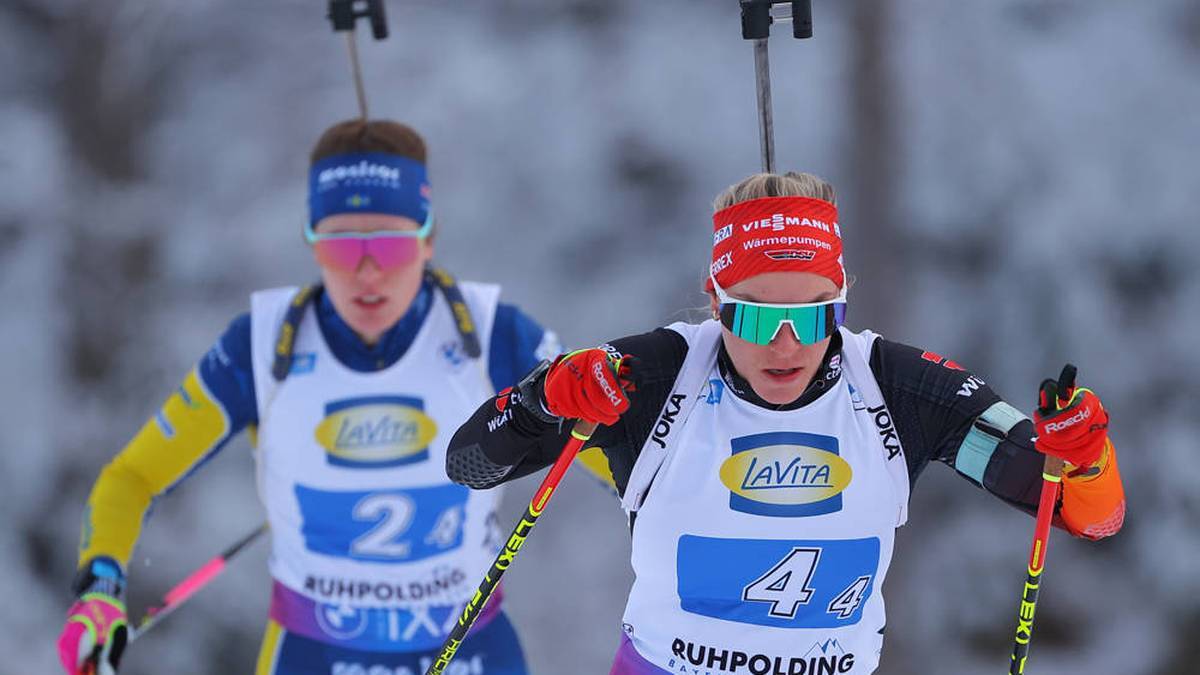
Aufgrund von gesundheitlichen Problemen, die lange Zeit nicht definiert werden konnten, verliert Hanna Kebinger rund eineinhalb Jahre. Im SPORT1-Interview spricht die deutsche Biathletin über diese Zeit und ihren Plan für die Rückkehr.
Hanna Kebinger hat in ihrer Karriere bereits einige Höhen und Tiefen durchlebt. Als aufstrebendes Talent schaffte sie im Winter 2022/2023 den Durchbruch: Sie gewann bei der Heim-WM in Oberhof Silber mit der Staffel und lief im Weltcup bei acht Rennen sechsmal in die Top 15. Nach dem Rücktritt von Denise Herrmann-Wick sahen viele Kebinger sogar als neues Zugpferd – auch innerhalb des DSV.
Doch gesundheitliche Probleme, allen voran eine Corona-Erkrankung, bremsten die 27-Jährige Ende 2023 erheblich aus. Kebinger verpasste auch die WM 2024 wegen anhaltender Formschwäche und beendete daraufhin ihre Saison vorzeitig. Im vergangenen Winter versuchte sie es noch einmal im zweitklassigen IBU-Cup, kam dort aber nicht über einige enttäuschende Ergebnisse hinaus.
Hannah Kebinger hat schwere Zeiten hinter sich
Lange rätselte Kebinger darüber, was mit ihrem Körper los war – ohne eine Antwort zu erhalten. Ärzte und Experten tappten im Dunkeln. Fans warteten, aber hörten nichts. Manche Medien spekulierten gar über ein stilles Karriereende.
Aber dazu kommt es nicht. Denn mittlerweile hat Kebinger Antworten auf ihre Fragen und blickt wieder kämpferisch in die Zukunft. SPORT1 sprach mit der gebürtigen Bayerin.
SPORT1: Hanna Kebinger, Sie haben zuletzt Mitte Januar 2024 an einem Weltcup teilgenommen. Auch die vergangene Saison mussten Sie aus gesundheitlichen Gründen vorzeitig beenden. Daher die wichtigste Frage vorweg: Wie geht es Ihnen?
Hanna Kebinger: Soweit ist alles gut. Was meine Gesundheit betrifft, befinde ich mich endlich auf dem Weg der Besserung. Ich bin noch nicht bei 100 Prozent. Aber ich kann auf jeden Fall behaupten, dass ich Fortschritte spüre, sodass ich mich wieder besser fühle und mehr ich selbst sein kann.
Kebinger: Post-Covid war der Grund
SPORT1: Bei Instagram schrieben Sie, dass Sie des „Rätsels Lösung einen großen Schritt näher gekommen” sind und Sie spüren, „wie es nach langer Zeit endlich bergauf geht”. Was ist denn die Lösung des Rätsels?
Kebinger: Im Grunde litt ich an Post-Covid. Dadurch konnten meine Mitochondrien, die für die Energieproduktion des Körpers zuständig sind, ihre Arbeit nicht mehr richtig verrichten, wie es bei einem normalen Energiehaushalt der Fall wäre. Das ist immer schlecht, im Leistungssport aber besonders heftig. Mein Körper war nicht in der Lage, genügend Energie zu produzieren, damit ich im Training oder bei Wettkämpfen durchhalte. Es dauerte ewig, bis die Diagnose feststand. Das ging nur über umfangreiche Blutbilder. Umso glücklicher bin ich jetzt, dass ich weiß, was los ist.
SPORT1: Wann fingen diese Probleme an?
Kebinger: Meine Corona-Erkrankung liegt jetzt anderthalb Jahre zurück. Im Sommer 2022 war ich schon einmal an Corona erkrankt, damals hatte ich aber nur leichte Probleme mit der Lunge. Zu Beginn der Saison 2023/24 erwischte es mich in Östersund dann zum zweiten Mal – und seitdem ist nichts mehr wie vorher.
„Hatte definitiv Angst um den Sport“
SPORT1: Was ging Ihnen in den vielen Wochen und Monaten, in denen Sie nicht wussten, was mit Ihrem Körper los war, durch den Kopf?
Kebinger: Es ist schwer, dafür die richtigen Worte zu finden. Aber man fühlt sich einfach völlig leer und fertig, man hat für nichts mehr Energie. Das begann bei den simpelsten Dingen wie Spazierengehen. Ein paar Schritte und ich war sofort aus der Puste. Da bekam ich schon Angst, dass es nicht mehr besser wird und vielleicht ein Dauerzustand bleibt. Und wenn dir selbst die Ärzte lange nicht sagen können, was das Problem ist, ist das noch erdrückender. In diesen Momenten fühlt sich alles ungewiss an.
SPORT1: War Ihnen von Anfang an klar, dass Sie weiterhin Leistungssport ausüben können würden?
Kebinger: Nein, manchmal hatte ich definitiv Angst um den Sport. Um das, worauf man jahrelang hingearbeitet hat, um das, was die eigene Leidenschaft ist. Vor meinem inneren Auge sind meine Kindheitsträume erst einmal zerplatzt. Ich dachte mir: Wenn es jetzt gar nicht mehr besser wird, ist alles futsch.
Karriereende von Hanna Kebinger wurde schon spekuliert
Gesundheit wichtiger als Biathlon
SPORT1: Solche Erlebnisse verschieben sicherlich auch die Prioritäten und verändern die Sichtweise auf die Dinge.
Kebinger: Auf jeden Fall. Mir ist schnell klar geworden, dass der Sport zwar schon noch die Sache ist, für die man brennt, die Gesundheit aber das wichtigste Gut im Leben ist. Man hat ja hoffentlich auch nach der Karriere noch ein langes Leben, in dem man viele tolle Dinge machen kann. Wenn die Gesundheit dann nicht mitspielt, verschiebt sich der Fokus automatisch. Früher war der Sport für mich immer die Nummer eins, alles andere kam nebenher. Inzwischen sehe ich das anders.
SPORT1: Ende 2015 zogen Sie sich bei einem Rennunfall eine Nackenverletzung zu, die ihren Gleichgewichtssinn und ihre Konzentrationsfähigkeit über längere Zeit beeinträchtigte. 2019 folgte wegen einer Herzbeutelentzündung eine weitere längere Pause. Jetzt kam die Zwangspause wegen Post-Covid hinzu – viele Rückschläge. Was treibt Sie immer wieder an?
Kebinger: Der Grund ist einfach: Ich liebe diesen Sport. Ich war von klein auf draußen in der Natur unterwegs, habe mich wahnsinnig gerne bewegt und bereits im Kindergartenalter eine Leidenschaft für das Langlaufen entwickelt – und dann auch schnell für Biathlon. Solange mich das innerlich antreibt, werde ich meine Karriere nicht aufgeben. Dass ich den Weg zurück schon einmal bewältigt habe, spornt mich an. Natürlich wird es nicht leichter, dass ich mich nun zum dritten Mal zurückkämpfen muss. Aber ich habe in den letzten Jahren bewiesen, dass ich ein Stehaufmännchen bin und immer wieder nach oben zurückkommen kann – egal, wie oft man mich umschubst (lacht).
DSV: Kebinger nicht mehr im Kader
SPORT1: Der Deutsche Skiverband (DSV) hat seine Kaderlisten für die kommende Saison bereits veröffentlicht. Ihr Name fehlt in den neuen Mannschaftseinteilungen – Sie haben keinen Kaderstatus mehr. Waren Sie davon überrascht?
Kebinger: Ich wusste schon vor der offiziellen Bekanntgabe, dass es nicht für die höchste Kaderstufe reicht. Dadurch, dass ich jetzt weiß, was mit mir los war, hoffte ich, dass es vielleicht noch mit einem Ergänzungskader oder etwas Ähnlichem klappt. Aber klar, auf der anderen Seite habe ich die Kaderkriterien leistungstechnisch nicht erfüllt. Die Entscheidung ist sportlich erklärbar. Ich bekam letztes Jahr schon einen Krankenstatus und das volle Vertrauen vom DSV, gleich wieder in der Lehrgangsgruppe 1a zu stehen – das war nicht selbstverständlich.
Hanna Kebinger gewann Silber bei Heim-WM
SPORT1: Wie schnell es zurück nach oben gehen kann, haben Sie im Winter 2022/23 selbst demonstriert, als Sie binnen zwei Monaten vom Deutschlandpokal über den IBU-Cup bis in den Weltcup und zur WM nach Oberhof stürmten. Dort waren Sie gar Teil der Silber-Staffel um Denise Herrmann-Wick.
Kebinger: Genau. Das ist eine große Zusatzmotivation. Am wichtigsten ist, dass ich weiterhin Teil des Zoll-Skiteams bin und Unterstützung erhalte. Dafür möchte ich mich bei Felix Bitterling bedanken, der immer noch an mein Potenzial glaubt. Er hat sich bei meinem Arbeitgeber extrem dafür eingesetzt, dass ich weiterhin gefördert werde. Die Qualifikationsmöglichkeiten sind ohnehin sehr offen. Ich habe alle Chancen und wenn ich gut genug bin, kann mich ganz normal für den Weltcup qualifizieren. Bis dahin will ich in aller Ruhe zu mir selbst und wieder zu 100 Prozent zurück in den Trainingsalltag finden.
„Mein Ziel ist es, wieder in den Weltcup zurückzukehren“
SPORT1: Welche Ziele stecken Sie sich für den kommenden Winter?
Kebinger: Mein Ziel ist es, wieder in den Weltcup zurückzukehren. Was danach kommt, lasse ich auf mich zukommen. Nach zwei Jahren wäre es auch schwierig, es anders zu vermitteln. Für mich ist es zunächst einmal entscheidend, stabile Leistungen zu bringen und gesundheitlich wieder auf der Höhe zu sein. Der Rest wird sich dann hoffentlich von selbst ergeben.
SPORT1: Schielen Sie mit einem Auge noch auf die Olympischen Spiele?
Kebinger: Selbstverständlich glaube ich daran, bei Olympia dabei sein zu können. Als Sportlerin schwebt einem so etwas automatisch im Hinterkopf – das muss auch so sein. Aber ich will mir keinen Stress machen, sondern von Woche zu Woche schauen. Ich gehe die Sache mit kleinen Zielen an.
SPORT1: Wenn Sie eine Kristallkugel hätten, was würden Sie wissen wollen?
Kebinger: Ich glaube, ich möchte überhaupt nicht wissen, was in der Zukunft passiert. Es ist viel schöner, im Hier und Jetzt zu leben und sich überraschen zu lassen.
Due to health problems that could not be defined for a long time, Hanna Kebinger loses about one and a half years. In the SPORT1 interview, the German biathlete talks about this time and her plan for her return.
Hanna Kebinger has already experienced some ups and downs in her career. As an up-and-coming talent, she made her breakthrough in the winter of 2022/2023: she won silver with the relay at the home World Championships in Oberhof and finished in the top 15 six times in eight World Cup races. After Denise Herrmann-Wick’s retirement, many even saw Kebinger as the new top athlete – also within the DSV.
However, health problems, especially a corona infection, slowed the 27-year-old down considerably at the end of 2023. Kebinger also missed the 2024 World Championships due to persistent weakness and ended her season prematurely. Last winter she tried again in the second-class IBU Cup, but did not get beyond some disappointing results.

Hannah Kebinger has had tough times
Kebinger puzzled for a long time about what was wrong with her body – without getting an answer. Doctors and experts were in the dark. Fans waited, but heard nothing. Some media even speculated about a silent end to her career.
But it won’t come to that. Because in the meantime Kebinger has answers to her questions and is looking to the future with a fighting spirit again. SPORT1 spoke to the native Bavarian.
SPORT1: Hanna Kebinger, you last took part in a World Cup in mid-January 2024. You also had to end last season prematurely for health reasons. Therefore, the most important question first: How are you?
Hanna Kebinger: So far, everything is fine. As far as my health is concerned, I am finally on the road to recovery. I’m not at 100 percent yet. But I can definitely say that I feel progress, so that I feel better again and can be more myself.
Kebinger: Post-Covid was the reason
SPORT1: On Instagram, you wrote that you have come “a big step closer to the solution to the puzzle” and that you feel “that things are finally looking up after a long time”. What is the solution to the puzzle?
Kebinger: Basically, I was suffering from post-Covid. As a result, my mitochondria, which are responsible for the body’s energy production, were no longer able to do their job properly, as would be the case with a normal energy balance. That’s always bad, but especially tough in competitive sports. My body was not able to produce enough energy for me to last in training or competitions. It took forever for the diagnosis to be made. That was only possible with extensive blood tests. I’m all the happier now that I know what’s going on.
SPORT1: When did these problems start?
Kebinger: My corona illness is now a year and a half ago. I already had corona in the summer of 2022, but at that time I only had slight problems with my lungs. At the beginning of the 2023/24 season, it caught me in Östersund for the second time – and nothing has been the same since then.
“Was definitely afraid for the sport”
SPORT1: What went through your head in the many weeks and months when you didn’t know what was wrong with your body?
Kebinger: It’s hard to find the right words for it. But you just feel completely empty and done, you have no energy for anything anymore. It started with the simplest things like going for a walk. A few steps and I was immediately out of breath. That’s when I started to worry that it wouldn’t get any better and might remain a permanent condition. And when even the doctors can’t tell you what the problem is for a long time, it’s even more crushing. In those moments, everything feels uncertain.
SPORT1: Was it clear to you from the beginning that you would still be able to do competitive sports?
Kebinger: No, sometimes I was definitely afraid for the sport. For what you’ve worked towards for years, for what is your passion. In my mind’s eye, my childhood dreams burst first. I thought to myself: If it doesn’t get any better now, everything is gone.
Hanna Kebinger’s career end has already been speculated
Health is more important than biathlon
SPORT1: Such experiences certainly shift priorities and change the way you look at things.
Kebinger: Definitely. It quickly became clear to me that sport is still the thing you burn for, but health is the most important thing in life. You hopefully still have a long life after your career in which you can do many great things. If your health doesn’t play along then, the focus automatically shifts. In the past, sport was always number one for me, everything else came along the way. I see that differently now.
SPORT1: At the end of 2015, you suffered a neck injury in a racing accident, which impaired your sense of balance and concentration for a long time. In 2019, another long break followed due to pericarditis. Now there was the forced break due to Post-Covid – many setbacks. What drives you again and again?
Kebinger: The reason is simple: I love this sport. I was out in nature from an early age, I loved to move around and I developed a passion for cross-country skiing as early as kindergarten age – and then quickly for biathlon. As long as that drives me internally, I will not give up my career. The fact that I have already managed the way back once spurs me on. Of course, it won’t be easier that I now have to fight my way back for the third time. But I have proven in recent years that I am a resilient person and can always come back to the top – no matter how often you push me over (laughs).
DSV: Kebinger no longer in the squad
SPORT1: The German Ski Association (DSV) has already published its squad lists for the coming season. Your name is missing in the new team classifications – you no longer have squad status. Were you surprised by that?
Kebinger: I knew before the official announcement that it would not be enough for the highest squad level. The fact that I now know what was wrong with me made me hope that it might still work with a supplementary squad or something similar. But of course, on the other hand, I did not meet the squad criteria in terms of performance. The decision can be explained in terms of sports. I already received sick status last year and the full confidence of the DSV to be back in training group 1a – that was not a matter of course.

Hanna Kebinger won silver at the home World Championships
SPORT1: You demonstrated how quickly you can get back to the top in the winter of 2022/23, when you stormed from the Deutschlandpokal to the IBU Cup to the World Cup and the World Championships in Oberhof within two months. There you were even part of the silver relay team around Denise Herrmann-Wick.
Kebinger: Exactly. That’s a big additional motivation. The most important thing is that I continue to be part of the customs ski team and receive support. I would like to thank Felix Bitterling for that, who still believes in my potential. He has made an extreme effort with my employer to ensure that I continue to be supported. The qualification opportunities are very open anyway. I have every chance and if I’m good enough, I can qualify for the World Cup as normal. Until then, I want to calmly find my way back to myself and back to 100 percent in everyday training.
“My goal is to return to the World Cup”
SPORT1: What goals have you set for yourself for the coming winter?
Kebinger: My goal is to return to the World Cup. I’ll let what comes after that come to me. After two years, it would be difficult to convey it any other way. For me, it is first and foremost important to deliver stable performances and to be back on top of my health. The rest will hopefully take care of itself.
SPORT1: Are you still eyeing the Olympic Games?
Kebinger: Of course I believe that I can be at the Olympics. As an athlete, something like that is automatically in the back of your mind – it has to be. But I don’t want to stress myself out, but look from week to week. I’m tackling the matter with small goals.
SPORT1: If you had a crystal ball, what would you want to know?
Kebinger: I don’t think I want to know what will happen in the future at all. It’s much nicer to live in the here and now and be surprised.